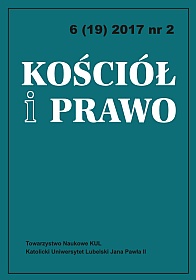The Relevancy of Natural Law
Abstract
In the face of legal positivism which is spreading both in Europe and in the whole world towards different directions and systems of juristic thinking relativizing the truth about ordo iuris as, among other things, the foundation of overall development of psychical and spiritual life, it is worth recalling the existence of ius naturae and consider it anew. Detaching the legal-natural order from eternal, unchangeable and absolutely perfect God inevitably leads to relativization of natural law in its attributes: universality, objectiveness and invariability of its most important principles, which for a human person means not only losing the true Creator from the horizon of existence and thoughts, but also losing “the absolute point of reference” (J. Ratzinger) of moral and legal nature. Reversion to the classically viewed natural law in the context of creating the common constitution for the Old Continent seems an especially urgent matter for Europe as the cradle of the rational cognition and the conscious and free acceptance of natural law, which Jesus of Nazareth as true God and simultaneously true Man in one Person fulfilled in the most perfect way and sealed its up-to-date importance with His blood on Golgotha.
References
Gilson, Étienne. 1982. Bóg i filozofia. Translated by Maria Kochanowska. Warszawa: Instytut Wydawniczy Pax.
Guz, Tadeusz. 2007. “Gott als der Urheber des Naturrechts.” In Das Naturrecht und Europa, ed. Tadeusz Guz, 149-80. Frankfurt a.M.: Peter Lang. Europäischer Verlag der Wissenschaften.
Habermann, Gerd. 2005. Freiheit oder Gleichheit. Ein Alexis de Tocqueville-Brevier. Bern: Hep Verlag/Ott Verlag.
Krąpiec, Mieczysław Albert. 1994. Człowiek i prawo naturalne. Lublin: Redakcja Wydawnictw KUL.
Krąpiec, Mieczysław Albert. 2007. “Ius jako prawo natury – natura Prawa.” In Das Naturrecht und Europa, ed. Tadeusz Guz, 15-34. Frankfurt a.M.: Peter Lang. Europäischer Verlag der Wissenschaften.
Ratzinger, Joseph. 1991. “Wendezeit für Europa und für die Kirche. Gedanken zur Krise der Zeit und zu ihrer Überwindung.” Deutsche Tagespost 36:6.
Ratzinger, Joseph. 2003. Unterwegs zu Jesus Christus. Augsburg: St. Ulrich-Verlag.
Ratzinger, Joseph. 2004. “Die Welt braucht Gottes Anwesenheit. Allein die Kraft des dreifaltigen Gottes kann den Menschen vor der Zerstörung seiner selbst bewahren.” Deutsche Tagespost 70:3.
Rosenberg, Alfred. 1943. Der Mythus des 20.Jahrhunderts. Eine Wertung der seelisch-geistigen Gestaltenkämpfe unserer Zeit. 4th ed. München: Hoheneichen.
Schuman, Robert. 1963. Pour l’Europe. Paris: Édition Nagel S.A.
Tenbruck, Friedrich H. 1984. Die unbewältigten Sozialwissenschaften oder Die Abschaffung des Menschen. Graz: Styria.
Waldstein, Wolfgang. 2007. “Naturrecht in der europäischen Rechtsentwicklung.” In Das Naturrecht und Europa, ed. Tadeusz Guz, 303-27. Frankfurt a.M.: Peter Lang. Europäischer Verlag der Wissenschaften.
Copyright (c) 2017 Kościół i Prawo

This work is licensed under a Creative Commons Attribution-NonCommercial-NoDerivatives 4.0 International License.





